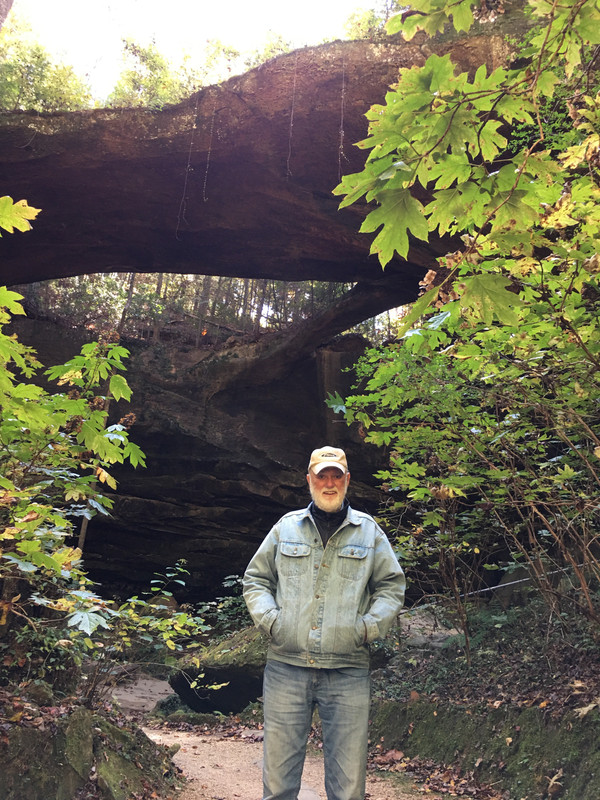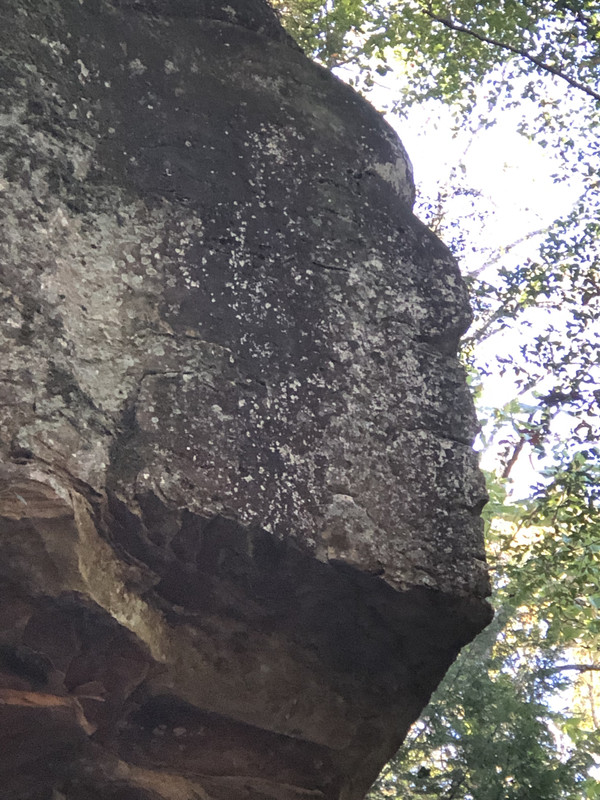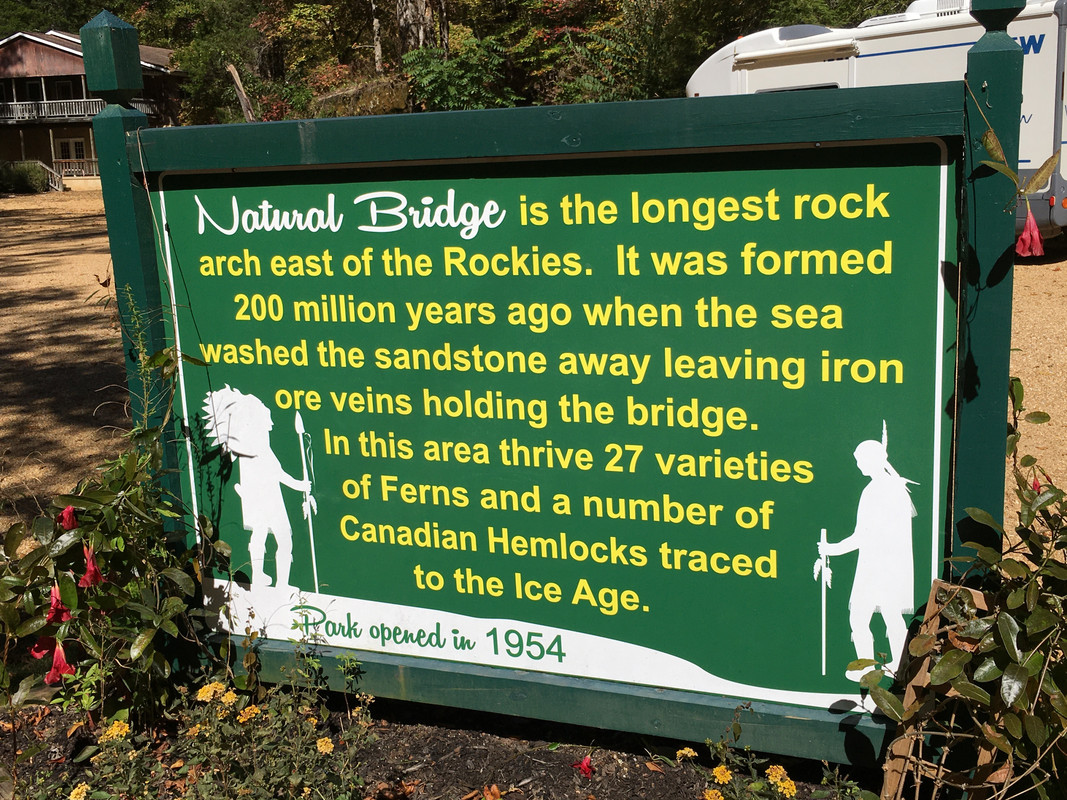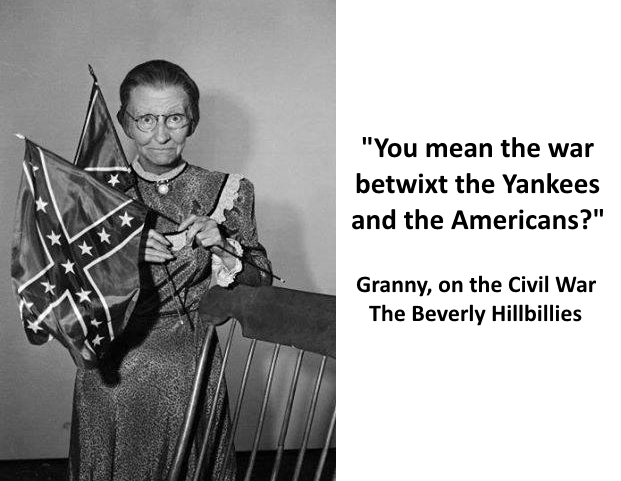The Free State of Winston… (The long version)
After visiting Natural Bridge Park, Ross and I rode to Double Springs, AL, the county seat of Winston County. We had a look around, then I had an inspiration to stop at the courthouse and seek information. A really nice lady in the County Clerk’s office gave us enough information to really whet our appetites, then she suggested we visit another lady (a local historian of sorts) in the ‘Archives’ building across the street…
We did. I bought one of the several books on local history they had for sale, and we chatted for some time with her. We then listened to a local older guy talk about his time in the Army during the Korean War. What a great visit! And that wasn’t all…
While seated at the statue outside the courthouse reading plaques and brochures and taking a couple of pictures, a local banker happened by and offered to answer our questions! This turned out to be a most delightful and informative stop!!!
Statue in front of the courthouse…

It’s hard to see in this shot, but there is an American flag to the viewer’s left crossed with the Confederate flag. The ‘soldier’ is clothed in distinctive apparel items resembling both a Union and a Confederate uniform. The soldier holds the hilt of a saber, while his foot is on the broken-off blade. The 'Dual Destiny' statue was to symbolize the end of bitter division, the coming together of the two factions and to represent a step forward in healing the deep wounds caused by that tragic conflict…
Winston County, more than most, had sharply divided but very strong feelings about the war and about secession in particular. The large majority of those there who ultimately served in the military during that war served on the Union side, the others who served did so in the Confederate army. Feelings were bitter and they intensified as hardships and the strains of war escalated and became worse with each succeeding year. Reprisals, murders, and other atrocities against the families of both sides were routinely inflicted at the hands of opposing sides…
For the most part, the citizens of Winston and many in other ‘hill country’ counties of north Alabama, didn’t feel like they had a dog in that hunt. They tried extremely hard to remain neutral, even to the point of taking a symbolic vote in Winston County to ‘secede from the state of Alabama’ (using the same arguments the state had used) when the state itself had voted to secede from the Union; ergo, the unofficial label ‘Free state of Winston’.
Many were eventually drawn into the conflict, however, due to the actions of both sides that ultimately forced participation upon them. Many other military aged men ‘hid out’ in the nearby forest around Natural Bridge to avoid being forced into service or otherwise punished by one faction or the other. Those who were captured by one side or the other were typically given the choice to either join their captors or die on the spot.
Natural Bridge, AL…

‘Indian Face’ rock formation at Natural Bridge

Story of Natural Bridge…

Natural Bridge a bit more recently…

Almost none of the people of that area were fire-breathing pro-slavery wealthy folk. That area did not lend itself well to large plantation undertakings, so the vast majority of locals were simply subsistence farmers, farm laborers, or other small merchants and the like. There were a few slave owners, and a few slaves, but mostly that simply was not an issue of any magnitude for nearly all locals. Their personal views and choices about slavery were one thing, but the ‘natural order of things’ and the reality of the way things were in the world into which they had been born was another.
It is also worth noting that the majority of the locals at that time could neither read nor write, and they lived in cabins or small houses often lacking even glass windows, wooden floors, or other ‘refinements’. They had been born into poverty and lived a very difficult, uncertain life with endless arduous work, disease, pain, and misery. Anything they couldn’t make or grow themselves was more often than not simply done without. Essential items like tools were acquired by barter or forage. Social interactions were largely limited to immediate and extended family members, neighbors, and/or fellow church members.
Even small children witnessed pain, suffering, and death on a large scale among their siblings and small circle of contacts. No child had ever not at times gone to bed hungry, quite cold or unbearably hot, sick, or otherwise miserable at least some of the time. Typically, one or more siblings had died of disease or mishap during their childhood, they’d had one or both parents lost to some cause, or wondered what might be down the road just a few miles… things they likely would never know.
As difficult as that existence was, however, it was not seen the same way we might think of it today. The earlier generations of kin who had migrated to this area had been escaping even more depressing and/or desperate circumstances, so this was viewed as an improvement with one glaring additional aspect: Hope! Beyond just survival, the prospect of opportunity for improvement of their situation motivated them to struggle on…
A common misconception is that white people in the south all had lived like Scarlet O’Hara of ‘Gone With The Wind’. There were folks like that, to be sure, but they were a small minority. The distribution of wealth versus poverty was not unlike that in the north… or even Europe at the time, actually, the entire world. The few very wealthy folks lived like royalty, while many of the rest lived no better than many of the enslaved people: Except, of course, for the dignity-robbing humiliation of being 'someone else's property', plus the inability to move at will, or being powerless to even keep ones' own family in-tact.
In the north, the rich owned factories and other places of large employment, where they employed masses of working poor. In the south they owned plantations and slaves. Three-fourths of white families in the south owned no slaves, and of those who did, approximately half of them owned two or less. Less than five percent of slave owners actually ‘owned’ large numbers of fifty or more other human beings. White population throughout the south in 1860 was more than twice as large as that for slaves.
For those in the ‘hill counties’, it was the issue of secession itself and the breaking apart of the Union which most did not favor at all that had resonated loudly. The large plantation owners and major slave holders of south Alabama (and all southern states) were the driving-force behind the secession juggernaut… Those same folks who also happened to be the principal opinion makers, as well as the political movers and shakers of the state.
Initially, most Winston County locals avoided taking any oaths of loyalty either to Alabama or the Confederacy, and they tried to go about their lives as before. As the war droned on and casualties mounted, though, and as the wealth of the state continued to be drained away, the state, to fill quotas and meet the desperate demands of the Confederacy, also implemented military conscription, and passed laws requiring a loyalty oath in order to vote.
Live-stock and farm produce were being increasingly confiscated as the needs of the armies of both sides continued to rise. This, of course, increased the hardships and desperation of those already suffering greatly from the war. Those who opposed secession and the war itself over time reluctantly began to lean towards involvement, but on the Union side! Most, however, simply sought to remain out of the 'unnecessary' struggle altogether…
Most folks today think the two sides in that conflict were both simply universally monolithic, unanimous, and eager constituencies: Pro-Slavery in the south, anti-slavery in the north. The move towards secession in the south was so driven at its core, because of the very real fear it was only a matter of time before slavery would be outlawed nationwide with devastating economic, social, and political consequences for the south.
The mythology of racism, originally fabricated to help ‘justify’ black slavery in the first place produced near panic at the prospects of all those black folks suddenly being turned loose. Other ‘justifications’ for rebellion, like states’ rights for example, were amplified or created to influence those who might lack strong enough views on slavery itself or, like most folks throughout the south, who actually owned no slaves themselves.
A ‘smorgasbord’ of ‘just reasons’ was ginned-up and offered to appeal to any who might listen as to why they should support ‘The Cause’. Without the overarching issue of slavery and all the associated implications, however, none of those other 'justifications’, even all combined, would have been sufficient to have led to secession and/or that tragic war.
The US national borders had continued to expand throughout the early 19th century, and immigration had continued unabated to explode driven in part by the hardships of over population and/or feelings of desperation 'at home' combined with the availability of vast amounts of newly acquired lands through wars, treaties, purchases, etc. Yes, the ‘huddled masses’ were indeed flocking to our shores in unprecedented numbers! They also decidedly tended to not look favorably upon the institution of slavery...
It was realized by southern interests that eventual statehood of the new lands (otherwise unsuitable for cheap labor-intensive large plantation agriculture and therefore beyond its influence) would at some point produce a majority in the US Senate sufficient to amend the constitution and overturn the ‘understanding’ that had existed in our nation from its founding. At the time, and right up until very recently actual parity, the south had enough senators to prevent abolition, but it was obvious to many that that would not remain the case indefinitely or even for very long.
The reality of this to those of the ‘ruling elite’ in the south made it obvious the South's status as a wealthy/powerful agricultural behemoth, and indeed the tremendous individual wealth of those elites themselves were both at stake. National political power for the south was inexorably lessening as political control gradually shifted towards the north which continued to grow and industrialize, while the west also continued to grow in population and influence. Each region, with its own unique needs, vied with each other for the 'attention' and favor of the Federal government.
In time, it seemed apparent, the south would be at a serious comparative disadvantage to the other regions that would manifest itself in terms of slavery abolition and the accompanying staggering economic loss, unfavorable national tax and tariff policies, along with the ability to impact the nation’s overall course. Their only hope of preserving the status quo and current power, it was thought, was to form a separate nation free of the ‘abolitionists’, radicals, usurpers, and troublemakers.
To support the argument for leaving the Union, the hotly and long-debated issue of states' rights re-intensified. Even at the founding of our nation, there were deeply divided beliefs on that subject, and those heated up again with the passing of the US Constitution. At the time just prior to the actual start of the War of 1812, many 'leaders' in the New England states were openly seriously discussing leaving the Union rather than going to war with England again (the primary trading partner of those states at the time). No successful secessions ever occurred, but that wasn't because the topic was unthinkable to a great many!
In the north initially, the more important issue to most folks was simply preserving the Union. It was widely recognized that in a scarry world full of powerful colonial nations eager to expand their empires, a fractured US offered far less of an obstacle to their ambitions… Indeed, it was during the 'distraction' of the American Civil War that France had actually installed Emperor Maximillian as head of the Mexican government. The emperor and his monarchy had replaced the ‘legitimate authority’ in that young republic!
In terms of international power size matters, so to most it seemed only logical that remaining united, therefore stronger, was seen as critical for survival, while secession posed a likely mortal threat to our young, fragile ‘political experiment’! In the end, however, most issues are decided based upon how they are perceived to impact 'me' personally. If I stand to lose big, I tend to oppose anything that threatens me personally. I will also look for 'moral justification' for my choices... all the while pointing to the ‘immorality’ of my adversaries.
There was a growing number of staunch and quite vocal abolitionists, to be sure, but at the outset their voices had not yet reached the fevered pitch they would in time… Most ordinary folks in the north were unwilling to go to war to end slavery at that time even though most did oppose it. As the war drug on, though, and as new ‘reasons’ were needed to stoke the fires of ‘patriotism’ and continue to bring the rebels to heel… The 'noble cause' of freedom for all soon dominated the discussions...
‘The sin of slavery’ provided the backdrop for all the upheavals of the time, but in the beginning preservation of the Union was the primary issue in the north. Meanwhile in the south, apprehension about the future of slavery with the very real prospect of economic catastrophe, the likelihood of undesirable social changes (this fear a byproduct of the contrived racism), the destiny of individual states, and the ‘rights’ of individuals themselves, plus the fact all that undesirable change would be forced upon them against their own wishes by 'outsiders' were on the minds of southern opinion makers.
At a local level, thoughts about local sovereignty, family loyalties, duty to friends and neighbors, or when and for what reason(s) might we be willing to take up arms all factored into the mix of reasons, too. Should viewing slavery as morally wrong be enough to obligate us to fight-to-the-death with our own family members and our neighbors who didn’t own slaves themselves and were actually fighting for other reasons entirely? Is the idea we’re better off together than we would be apart sufficient to induce me to kill folks I’ve known and cared about all my life? Is it my duty to take the life of loved ones (or surrender my own) simply because they have different moral and/or political views?
These and other pressing questions faced all of those in our nation, but especially those in the ‘borders’ region of our country. Missouri, Kentucky, West Virginia (still part of Virginia at the beginning), Maryland, and Delaware had all been ‘slave states’, but they did not actually secede from the Union. Even in other states, like Alabama for example, which did secede, among many slave owners themselves but especially among non-slave owners, the internal debates raged with fateful implications… and often fatal consequences… Brother against brother, father against son…
This ‘Gordian Knot’ was not unlike the issues facing the recent ancestors (grandparents and great grandparents) of the people of that time. The American Revolution had also produced painfully similar divisions among the ‘colonists’ of the time with ‘Loyalists’ on one side and ‘Patriots’ on the other. Families were likewise split on the issues of the day, especially leaving the English Commonwealth and forming a new nation versus remaining loyal subjects seeking redress of grievances from within. The horrors of war, particularly guerrilla warfare, were visited upon most all the civilian families and neighbors of those who served on one side or the other… in both wars!
Civil war is a terrible time for all, and for those caught in the middle of the calamity, it is particularly terrible. Today we look for simple explanations and easily identifiable causes to point us towards answers to questions about earlier times, but none of that ‘low-hanging fruit’ existed then. It was typically tragic, extremely difficult, always gut-wrenching, and usually painful for all concerned no matter what their choices were. All of that also had to be confronted then without benefit of the ‘hindsight’ we enjoy today… Things looked drastically different in 1865 than they had just four years before!
To more completely understand how all of this was viewed at the time, one needs to recall the circumstances of the lives being led by most at that time... Additionally, there was a general lack of useful, accurate information, but also the way the limited information was being 'spun' by those advocating for one course or the other. All existing hardships were compounded by the absence of military aged men either serving or hiding out, and the impact that had on food production for those who remained to fend for themselves while being preyed upon by foragers..
The constant 'foraging' by the militaries of both sides to support their own efforts, the deprivation constantly being experienced and compounded over time by the women, children, and old people who were still struggling at home to produce enough to simply survive... without the aid of their most able-bodied men. And there were the actions of the military men who 'foraged'; and, their 'bad acts' escalated as times became even harder...
It's nearly impossible for people who are comfortable, well-fed, and who have never truly known hardship to understand how atrocities like those visited upon or by civilians and opposing soldiers themselves could occur, but it is a reality of all wars throughout human history. As genuine hardship and suffering go up, the 'bar of morality' comes down...
It is by visiting such places and delving into the very real ‘human’ aspects of such a time, that we can begin to understand how such a tragedy could have come upon us… and how it might happen again… At the very center of all that calamity was human innocence, ignorance, deprivation, misery, greed, self-interest, ambition, the strong bonds and interdependencies between family members and friends, the need for status and influence, as well as the desire for wealth and position on both sides of the ‘border’ that led us down that sad path…Indeed, just as it often is in any conflict…
People are heavily influenced by what is going on right around them, especially what and how those they regard as important to them are choosing their own courses. Additionally, the same tendencies are seen today driving our so-called elites to push or pull us one way or the other for their own aims… And the same way people like us are choosing which ones to believe and follow. Then as now, there always seems to be far more virtue-signaling than actual virtue itself… The more things change, the more they seem to remain the same…
To simply say, “The American Civil War was about slavery,” is to grossly oversimplify and profoundly understate the complex dynamics of multiple issues (far more than just those few touched upon above) swirling around in the hearts and minds of the average people of the time. To say the war was not about slavery is to do the same…
Granny had her own view of the war…

DDT

